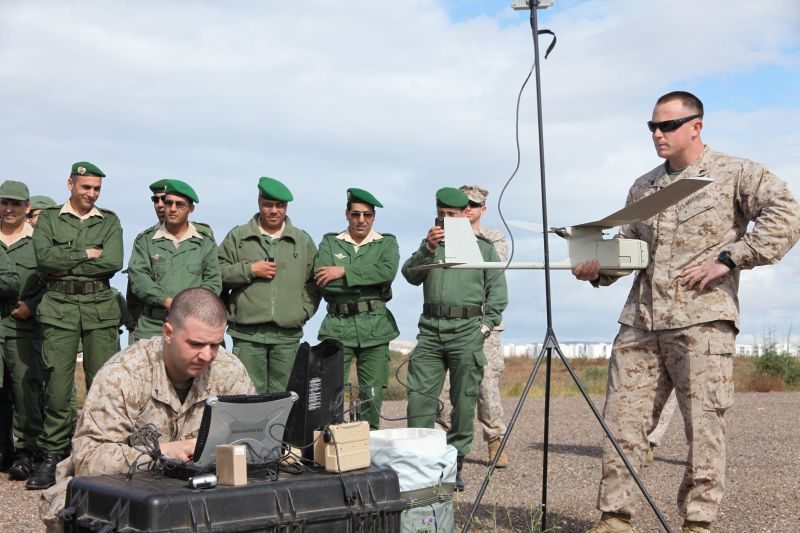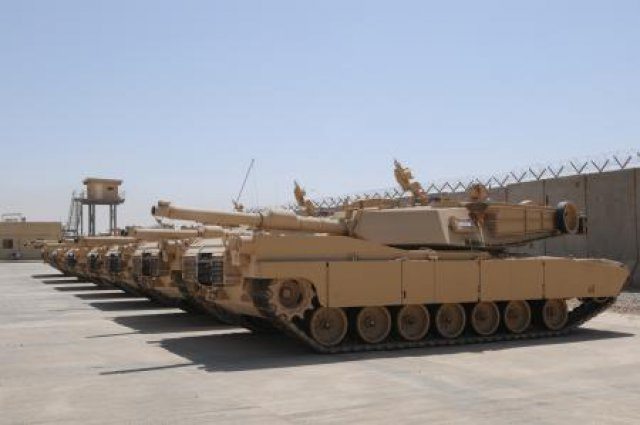Marines with the 24th Marine Expeditionary Unit demonstrated the capabilities of the MEU’s unmanned aerial system assets for members of the Royal Moroccan Armed Forces, April 12, at Inezgane Airfield.
The UAS demonstration was part of the Command Post Exercise portion of Exercise African Lion 12, a bi-lateral training exercise between U.S forces and Royal Moroccan Armed Forces to promote partnership and mutual understanding between each nation’s militaries.
The live flight of an RG-11B Raven, the smallest of the MEU’s unmanned aerial systems with a wingspan of 4 feet 6 inches and weight of just 4 pounds, highlighted the morning’s events.
A team of three Marines from the 24th MEU’s ground combat element, Battalion Landing Team 1st Battalion, 2nd Marine Regiment, assembled, prepared, launched and landed one of three Ravens before a crowd of dozens of Moroccan military members and other U.S. Marines and Soldiers taking part in African Lion.
Lance Cpl. Richard Hager, an intelligence analyst with the BLT and one of the 24th MEU’s licensed operators of the Raven, flew the unmanned aircraft above the crowd for 25 minutes, allowing a few licensed UAS operators from the Royal Moroccan Air Force to man the controls for a few seconds.
“One of the Moroccans I talked with is a UAS pilot for the Royal Air Force but he flies a bigger version, so we talked a lot about the size of the Raven,” Hager said. “The best part of this exercise for me is that this is the first time I’ve flown the Raven by myself – alone and unafraid – outside of a school environment. And it was fun to do it in Morocco with Moroccan military.”
While Hager busied himself with control of the unmanned system, Staff Sgt. David Wilcox, the BLT intelligence chief, talked several Moroccans through assembly of the other two planes as their peers and friends took advantage of photo opportunities with both the aircraft and the Americans.
“They were surprised at how easy it was to put together,” Wilcox said. “They enjoyed having three Ravens here so they could watch one fly and could still handle the other two and take pictures.”
Wilcox also talked to a group of Moroccans about using the Raven during real-world operations in Iraq in 2009.
“There was a lot of good information sharing going on,” he said.
The Raven’s primary mission is aerial reconnaissance using cameras mounted in its nose. The images can be recorded, photographed, or fed to a live-feed monitor on the ground to provide instant visual feedback to Marines, who might otherwise be blind to hostile activity around them.
Cpl. Kursten French, a scout sniper radio operator with the BLT, helped with the set-up of the Raven and recounted his experiences with it during a 2010 Afghanistan deployment with 1st Battalion, 2nd Marine Regiment.
“They were great for identifying targets that we normally wouldn’t have found,” French said.
The Marines set up live-feed video at Thursday morning’s demonstration through a laptop computer next to the crowd. 1st Lt. Ben Baker, an assistant intelligence officer for the 24th MEU, watched the video with many Moroccans, taking advantage of the opportunity to talk with Moroccan intelligence soldiers about its capabilities.
“They asked me about how we incorporate the UAS in operations and we discussed the similarities between how the Marine Corps and Moroccans employ intelligence assets,” said Baker.
Before the Raven flight, Baker briefed a slideshow presentation on the ScanEagle, another UAS asset available to the 24th MEU. The ScanEagle, weighing over 38 pounds with a wing span just over 10 feet, is much bigger than the Raven and is stored aboard the ships of the Iwo Jima Amphibious Ready Group.
Exercise African Lion 12 is scheduled through the middle of April. U.S. forces involved in the exercise include Marines and Sailors from the 24th MEU and the 14th Marine Regiment, a reserve unit based out of Fort Worth, Texas, and Soldiers from the Utah National Guard.











